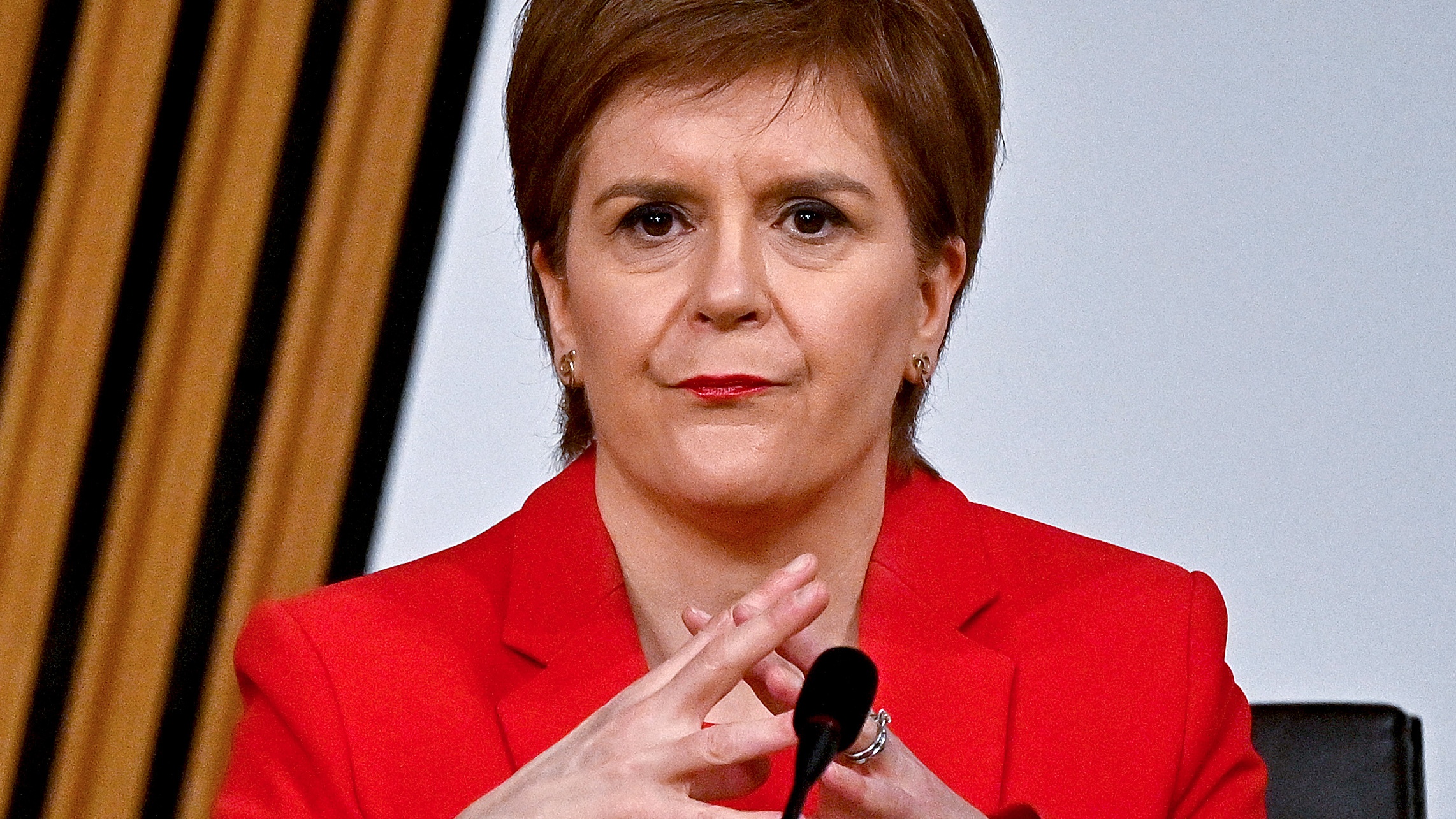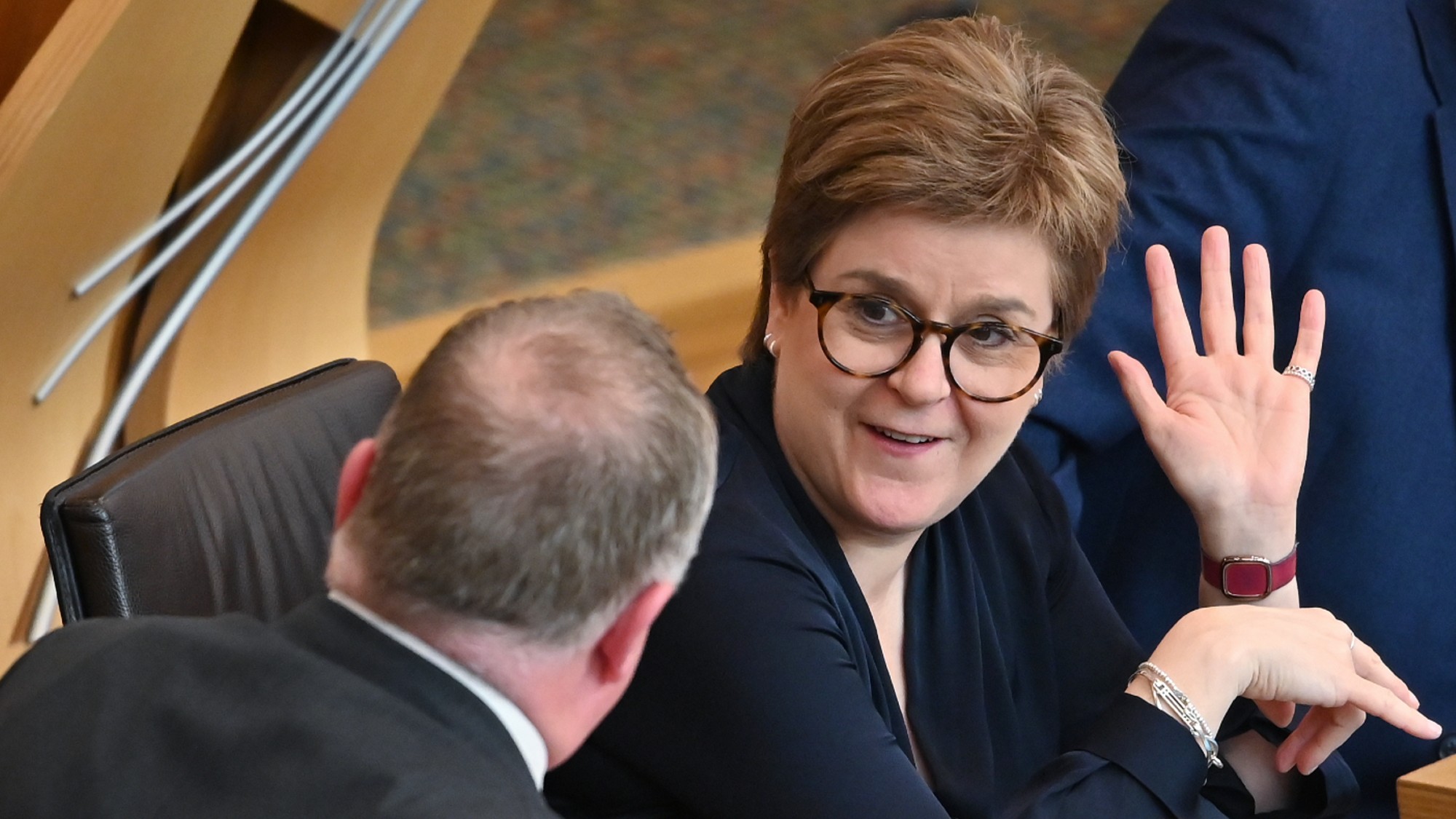Has Nicola Sturgeon dodged a bullet in Salmond war - and what next?
First minister’s eight-hour inquiry appearance produces no ‘smoking gun’

A free daily email with the biggest news stories of the day – and the best features from TheWeek.com
You are now subscribed
Your newsletter sign-up was successful
Nicola Sturgeon was battling for her political life yesterday as she faced a Holyrood inquiry into the handling of sexual harassment complaints against Alex Salmond.
During a marathon eight-hour appearance before the committee, the first minister denied her former ally’s “absurd” claims that she had conspired with Scottish National Party (SNP) colleagues to remove him from public life.
Sturgeon gave her testimony amid calls for her resignation, following claims from two other witnesses that she lied to her parliament. But the Scottish leader looks set to dodge that bullet, according to political pundits including Magnus Linklater, who writes in The Times that Sturgeon emerged from yesterday’s “interrogation” with her reputation “largely intact”.
The Week
Escape your echo chamber. Get the facts behind the news, plus analysis from multiple perspectives.

Sign up for The Week's Free Newsletters
From our morning news briefing to a weekly Good News Newsletter, get the best of The Week delivered directly to your inbox.
From our morning news briefing to a weekly Good News Newsletter, get the best of The Week delivered directly to your inbox.
Cool in the hot seat
Sturgeon told the inquiry that while her recollection was “not as vivid as I would like it to be”, she had not deliberately misled parliament about when she learned of the claims against her predecessor - which would represent a breach of the ministerial code.
The first minister had told MSPs that she was first informed of the allegations during a meeting with Salmond at her home on 2 April 2018. But Salmond’s former chief-of-staff Geoff Aberdein told the inquiry on Tuesday that the claims had been discussed during a meeting at her Holyrood office four days earlier, on 29 March.
However, Sturgeon told the inquiry that her memory of the initial meeting had been “obliterated” by her subsequent showdown with Salmond, who was acquitted of sexual assault charges in a criminal trial last year.
A free daily email with the biggest news stories of the day – and the best features from TheWeek.com
Her spirited defence appears to have paid off, says The Times’ Linklater, who concludes that “Nicola Sturgeon has survived” the potential threat posed by the inquiry.
Despite “weaknesses in her evidence, some points where questions were left lingering”, she fended off the accusations against her with “confidence but, perhaps more importantly, with passion”, he adds.
The first minister was on “formidable form”, agrees Chris Deerin in the New Statesman. Sturgeon defended her government’s investigation into Salmond with the “surgical precision and occasional shiftiness of the lawyer she once was”.
She admitted to just one major failure: an attempt to defend the government’s complaints process against a challenge by Salmond in the civil courts cost taxpayers more than £500,000.
But otherwise, Sturgeon “had an answer for everything”, Deerin continues. Despite “holes enough in her evidence and doubts about its veracity”, there appears to be no “smoking gun that can force Sturgeon from office”.
This lack comes as no surprise to The Telegraph’s Alan Cochrane. The committee was not “the best vehicle to sit in judgment” on the “failed” investigation into Salmond’s behaviour, Cochrane argues.
Sturgeon was helped by “badly constructed questions” from MSPs, which she was able to “easily bat away”.
The most striking moment in her otherwise “methodical” testimony came when she spoke of her disappointment in Salmond’s conduct during his tenure in the top job, says Dundee-based paper The Courier.
Sturgeon told the inquiry: “That he was acquitted by a jury of criminal conduct is beyond question. But I know, just from what he told me, that his behaviour was not always appropriate.
“I refused to follow the age-old pattern of letting a powerful man use his status and connections to get what he wants.”
What next?
Sturgeon is facing a second investigation headed by James Hamilton QC, the former head of public prosecutions in Northern Ireland, over whether the SNP leader broke the ministerial code. Questions also linger about who leaked the name of one of Salmond’s accusers to the former first minister’s team.
And not all of the inquiry members who heard evidence from Sturgeon yesterday are fully convinced by some of her answers.
As the committee begins drafting its report on the evidence given, Scottish Conservative MSP Murdo Fraser told BBC Radio’s Good Morning Scotland that Sturgeon “had no corroborating evidence to back herself up. That is why we are still of the view that Nicola Sturgeon has broken the ministerial code and has misled the Scottish parliament.”
Sturgeon may also be facing a possible motion of no confidence, after Scottish Tories leader Douglas Ross leader warned earlier this week that his party would be “submitting a vote of no confidence in the first minister”.
Nothing Sturgeon could say at the committee hearing would “counter the claims of numerous witnesses”, he added.
Sorcha Bradley is a writer at The Week and a regular on “The Week Unwrapped” podcast. She worked at The Week magazine for a year and a half before taking up her current role with the digital team, where she mostly covers UK current affairs and politics. Before joining The Week, Sorcha worked at slow-news start-up Tortoise Media. She has also written for Sky News, The Sunday Times, the London Evening Standard and Grazia magazine, among other publications. She has a master’s in newspaper journalism from City, University of London, where she specialised in political journalism.
-
 5 thoroughly redacted cartoons about Pam Bondi protecting predators
5 thoroughly redacted cartoons about Pam Bondi protecting predatorsCartoons Artists take on the real victim, types of protection, and more
-
 Palestine Action and the trouble with defining terrorism
Palestine Action and the trouble with defining terrorismIn the Spotlight The issues with proscribing the group ‘became apparent as soon as the police began putting it into practice’
-
 Why is the Trump administration talking about ‘Western civilization’?
Why is the Trump administration talking about ‘Western civilization’?Talking Points Rubio says Europe, US bonded by religion and ancestry
-
 How corrupt is the UK?
How corrupt is the UK?The Explainer Decline in standards ‘risks becoming a defining feature of our political culture’ as Britain falls to lowest ever score on global index
-
 The high street: Britain’s next political battleground?
The high street: Britain’s next political battleground?In the Spotlight Mass closure of shops and influx of organised crime are fuelling voter anger, and offer an opening for Reform UK
-
 Is a Reform-Tory pact becoming more likely?
Is a Reform-Tory pact becoming more likely?Today’s Big Question Nigel Farage’s party is ahead in the polls but still falls well short of a Commons majority, while Conservatives are still losing MPs to Reform
-
 Taking the low road: why the SNP is still standing strong
Taking the low road: why the SNP is still standing strongTalking Point Party is on track for a fifth consecutive victory in May’s Holyrood election, despite controversies and plummeting support
-
 Nicola Sturgeon's memoir: making the personal political
Nicola Sturgeon's memoir: making the personal politicalTalking Point Former Scottish first minister attempts to set record straight in 'Frankly' but does she leave more questions than answers?
-
 What difference will the 'historic' UK-Germany treaty make?
What difference will the 'historic' UK-Germany treaty make?Today's Big Question Europe's two biggest economies sign first treaty since WWII, underscoring 'triangle alliance' with France amid growing Russian threat and US distance
-
 Is the G7 still relevant?
Is the G7 still relevant?Talking Point Donald Trump's early departure cast a shadow over this week's meeting of the world's major democracies
-
 Angela Rayner: Labour's next leader?
Angela Rayner: Labour's next leader?Today's Big Question A leaked memo has sparked speculation that the deputy PM is positioning herself as the left-of-centre alternative to Keir Starmer